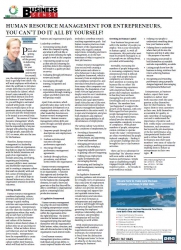
Human Resource Management for Entrepreneurs, You can’t do it all by yourself!- An interview with David White RSS Human Resource Management for Entrepreneurs, You can’t do it all by yourself!- An interview with David White2016-08-24 Pretty soon after getting your business off the ground, in delivering results for your customers and income for yourself, you, the entrepreneur, are going to need to get help from others. You will need employees with whom to share the workload, to introduce certain skills that you don’t have or to handle the ‘admin’, which doesn’t come naturally to you (and which distracts you from the business of your business). So, you will begin to surround yourself with people. People who you would expect to be as passionate about your business as you are and who would expect to be treated as you would treat yourself… The essence of ‘Human Resource Management’ which, by the way, is not a department
but the responsibility of anyone charged with achieving results through people, especially the CEO or owner, who sets the tone for the business. Therefore, human resource management is a leadership function within an organisation that helps to align the workforce with the beliefs, intentions and goals of an organisation. It includes attracting, developing, organising and retaining necessary skills to meet customer and shareholder expectations, and to creating a company culture that staff can identify with and feel a sense of belonging and purpose â€" all of which helps to channel behaviour to drive the organisation towards its desired outcomes. Driving Results Human resource management combines leadership, culture, diversity and human resource strategy to guide staffing activities and expectations within an organisation. Entrepreneurs are very often the founders of the organisations where they work, and as such have a profound influence on the belief system and culture of the business. Culture is about shared values, it defines who we are and what we believe. What we believe drives our behaviour, and our behaviour drives results. Entrepreneurs have the responsibility to create a customer focused delivery culture within their business, which will lead staff to achieve business and organisational goals. Leadership combines:
A Legislative Framework Human resource management has a big role and responsibility in helping entrepreneurs ensure that assumptions and expectations within the organisation drive the right behaviour. The desired outcome for human resource management being that staff align themselves with the organisations belief system, values, structure, and take self-directed action to help the organisation reach desired results. Good human resource management practices combine individual and group ability, to create inspired leaders who work tirelessly to contribute towards reaching organisation goals. Bad human resource practices create followers of the organisational vision, who require constant supervision, reminding and micro management, to do the bare minimum of what is required in their job function. Human resource management does not end with creating a belief system and culture to drive behaviour. It also includes a legislative framework, which is necessary from an employment and compliance perspective, and introduces best practice gained from many other companies over millennia. The foundation of our South African legal practices is deeply rooted in our Constitution, and is a platform to ensure fairness and equal opportunity. South Africa has one of the most advanced and respected human resource management legislative frameworks in the entire world. It is open and transparent, and gives both employers and employee rights and responsibilities in all circumstances of employment. The various Labour Acts enforce basic conditions of employment; by
With employment practices compliant with statutory requirements and an ‘on-side’ workteam, the entrepreneur is freed from the distraction of ‘background noise’ to focus on what he or she does best, growing the business! Investing in Human Capital Your business has grown and with it the number of people you employ. This is your investment in human capital. As with all investments, this particular asset must be properly managed or, as it is people we are talking about, provided with leadership. Inevitably, increasing the numbers of people brings with it, increasing complexity! Most entrepreneurs find it difficult to cope with people induced complexity as it distracts their attention to running the business like no other! The DRG Outsourcing experience with enterprises that have grown their employee numbers is that they have not been managing this growth with forethought and in a structured fashion. The numbers have ‘just happened’ to support the growth of the business, with very little regard for best-practice people management processes. South African employmentrelated law also introduces unavoidable complexity in terms of compliance. With greater numbers of people, enterprises cannot continue to operate ‘under the radar’. Entrepreneurs are often overwhelmed by people induced complexity â€" finding it a far greater challenge than any brought by day-to-day business activities. There can be no substitute for leadership! The ‘absentee owner’ will soon suffer a decline in business performance. Simple steps to establishing Highly Engaged People taking Self-Inspired Action … for Results in your workforce include:
importance of positive cash flow. Unlike many conventional businesses, such awareness lies beyond the job description or the key performance area. Entrepreneurial leaders will seek to infuse their passion for business into their team members’ own sense of values by creating a working environment enabling them to behave as entrepreneurs in their own right. DRG Outsourcing (Pty) Ltd Tel: +27 (0) 31 - 767 0625 Fax: +27 (0) 31 - 767 3280 david@drg.co.za www.drg.co.za |
Human Resource Management for Entrepreneurs, You can’t do it all by yourself!- An interview with David White
Copyright © 2026 KwaZulu-Natal Top Business